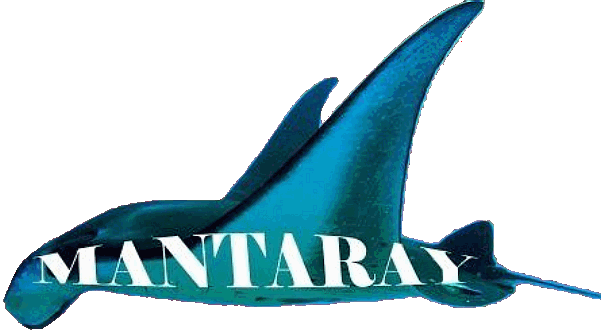|
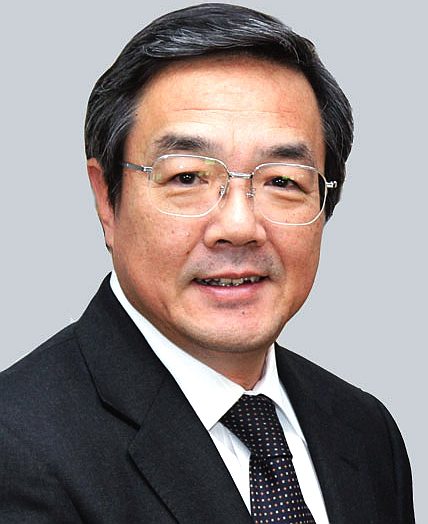
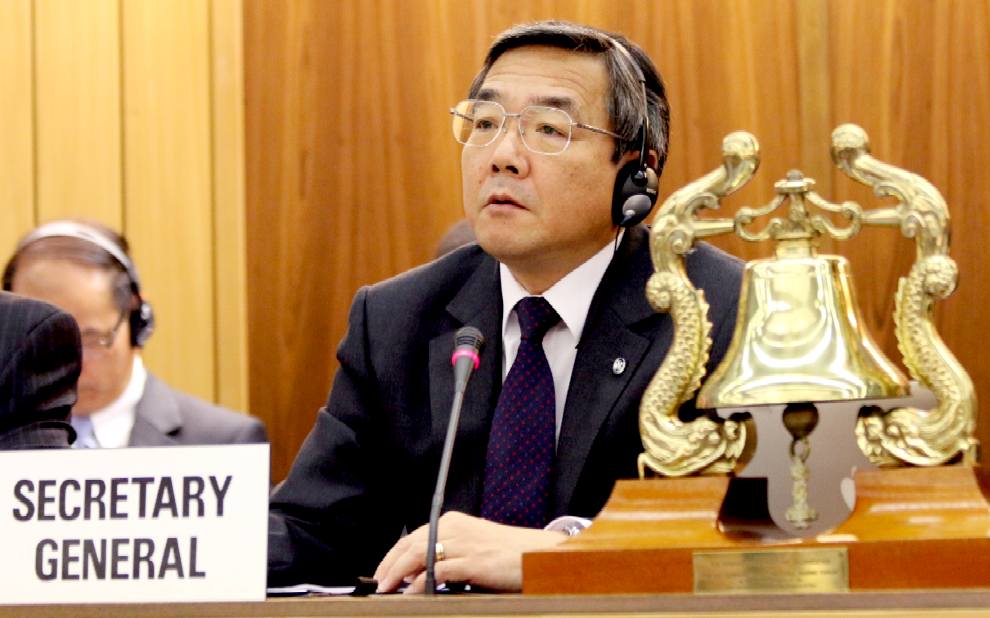
KOJI
SEKIMIZU - (left) was elected Secretary-General of the Organization by the 106th session of the IMO Council in June 2011 for a four-year period beginning 1 January 2012. The election was endorsed by the IMO's Assembly at its 27th session in November 2011.
15 OCTOBER 2014 -
(right) The 67th Marine Environment Protection Committee (MEPC 67) session was a busy five-day hearing, with a total of 145 documents submitted under 20 items on the agenda.
IMO Secretary-General Koji Sekimizu addressed delegates at the opening of MEPC 67 first commenting on the regulatory work of the organisation so far, “in tandem with capacity-building efforts, to mitigate the threats to the world’s seas and oceans”. He also touched on some of the challenges the organisation is facing as they relate to the Global Ocean Committee’s report From Decline to Recovery: A Rescue Package for the Global Ocean, and its recommendations on sustainable use of the global oceans,
“which I regard also very important for the future sustainability of international
shipping.”
Kitack Lim (Republic of Korea)
was elected as the Secretary-General of the International Maritime Organization (IMO), with effect from 1 January 2016,
taking over from Mr Sekimizu for two terms.
SEANEWS
INTERVIEW MAY 6 2013
SeaNews: Mr. Secretary-General; we would like to thank you first for allocating your time for as during the busy agenda wehere MSC 92 meetings continue. There are a number of maritime students having difficulty to find availability at the merchant fleet for training. Recently, there have been efforts by the maritime educational institutions to create a pool for maritime training both at the supply and demand side. There are two Turkish universities also leading in these efforts. What will be the contribution of IMO on these efforts and what do you think on this problem?
Koji Sekimizu: Effective maritime education and training are crucial elements in sustaining the supply of competent, quality seafarers, with the human element at the heart of safe, secure and environmentally friendly shipping.
IMO’s role is to ensure the standards in the STCW Convention and Code are kept up to date and relevant and to provide support to training institutes, such as through the development and validation of model training courses, to facilitate ensuring consistent delivery of training worldwide.
And, in this context, IMO through its Integrated Technical Co-operation Programme (ITCP), plans to conduct a regional training course for simulator instructors for selected countries in the Arab States and Mediterranean region to be hosted by Turkey, subject to agreement by the Government, in the third quarter of this year. This will contribute to the enhancement of the skills and competence of trainers in Turkey and in the region.
Our ITCP is also supporting the Global On-board Training Centre (GOBTC), whose Secretariat is based in Istanbul, with the aim of securing training berths for cadets who lack the opportunity to complete their mandatory sea-time. IMO will be formalizing its partnership with GOBTC through a Memorandum of Understanding, which will provide the vehicle for allocating a number of fellowships to cadets from developing countries.
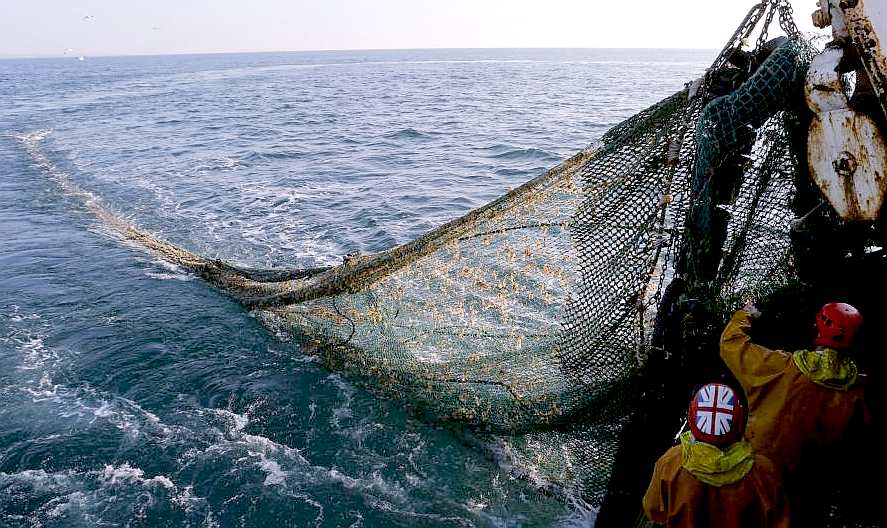
RICH COUNTRIES PAY ZOMBIES $5 BILLION A YEAR IN SUBSIDIES TO PLUNDER THE OCEANS
- The industrial fleet that now drags the high seas for fish has a combined engine power 10 times stronger than it did in 1950. Its nets are so huge that they’re sometimes big enough to hold 12 jumbo jets. And it is largely thanks to this all-out assault on high-seas fishing stocks that two-thirds of those stocks
(paywall) are at the brink of collapse - or well past the edge. 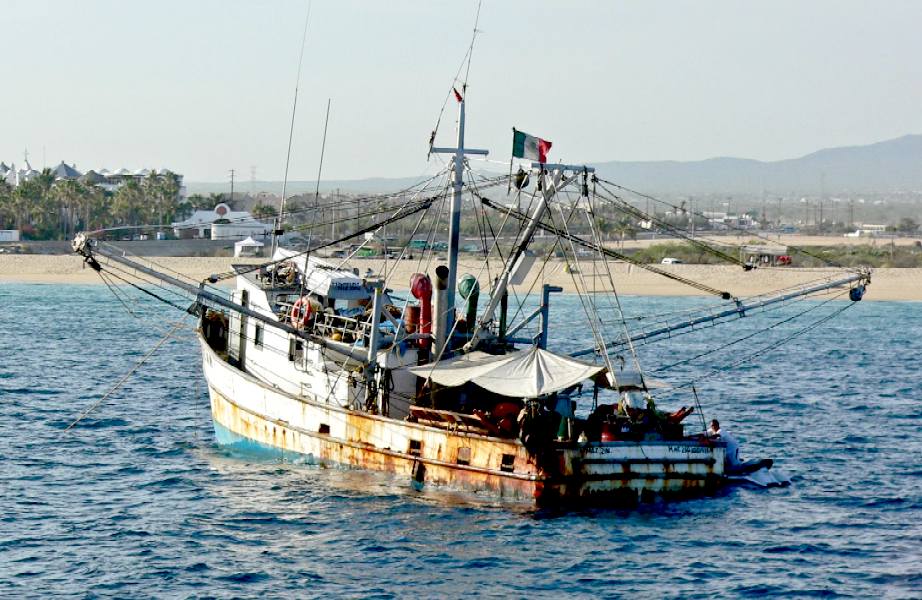
But instead of discouraging this trend, rich countries are paying those vessels to
over-fish like there’s no tomorrow. Japan, China, the US, the EU and other countries pay $27 billion to subsidize these vessels, according to a report
by the Global Ocean Commission, an independent body of international leaders focused on ocean conservation policy. Of that, $5 billion alone goes on fuel subsidies from rich countries to industrial fishing fleets.
Entrepreneurs like those in the Che Guevara 2 above, who are not damaging
the environment, don't compete on a level playing field.
SeaNews: What is your perception of Turkey’s contribution to the maritime sector and, in particular, to the work and objectives of IMO?
Koji Sekimizu: At this very moment, we are holding the 92nd session of our Maritime Safety Committee and it was a great honour for IMO to have been presented by the Government of Turkey, during the course of this meeting, with a mosaic representation of the 500-year old Piri Reis Map. When you consider that it was drawn up as far back as 1513, that feat in itself tells us a great deal about Turkey’s contribution to the history of cartography, navigation and, indeed, the safety ethos that pervades all of our endeavours in the maritime field.
In this context, I visited Turkey last year and was shown the VTS Centre in Istanbul, where I saw a well-organized traffic information and management system for ships, which has been in service since the end of 2003. I was impressed by this modern system and considered that Istanbul was, and is, ideally placed to be the standard-bearer for a worldwide ‘Accident Zero’ campaign. IALA is now making further progress with this campaign.
So, the safety of navigation and of lives at sea is a paramount factor for IMO and it is my view that, today, Turkish ships are performing very well, by complying with safety and environmental requirements: for example, in 2009,
Turkey moved from the grey to the white list of the
Paris MoU. This is significant progress and I, therefore, praise the effort of the Turkish shipping industry and appreciate the hard work of everybody involved.
Turkey has been a member of the IMO Council since 1999, which is surely an expression of confidence by the international maritime community in the country’s interest in, and determination to, develop its maritime sector. It also recognizes that Turkey contributes to IMO’s work at all levels and I particularly appreciate its efforts in combating piracy in the Gulf of Aden since 2009, and its consistent support for our technical co-operation activities, which are aimed at providing support to developing countries so that we have global, uniform and effective implementation and enforcement of IMO standards.
I am confident that the very constructive support and contribution from Turkey to the activities of IMO will continue to be strengthened because of the growing importance and excellent performance of the Turkish shipping industry, supported by the Turkish Government under the strong leadership of the Minister of Transport, Maritime Affairs and Communications, and also because of the country’s permanent interest in our global objectives.
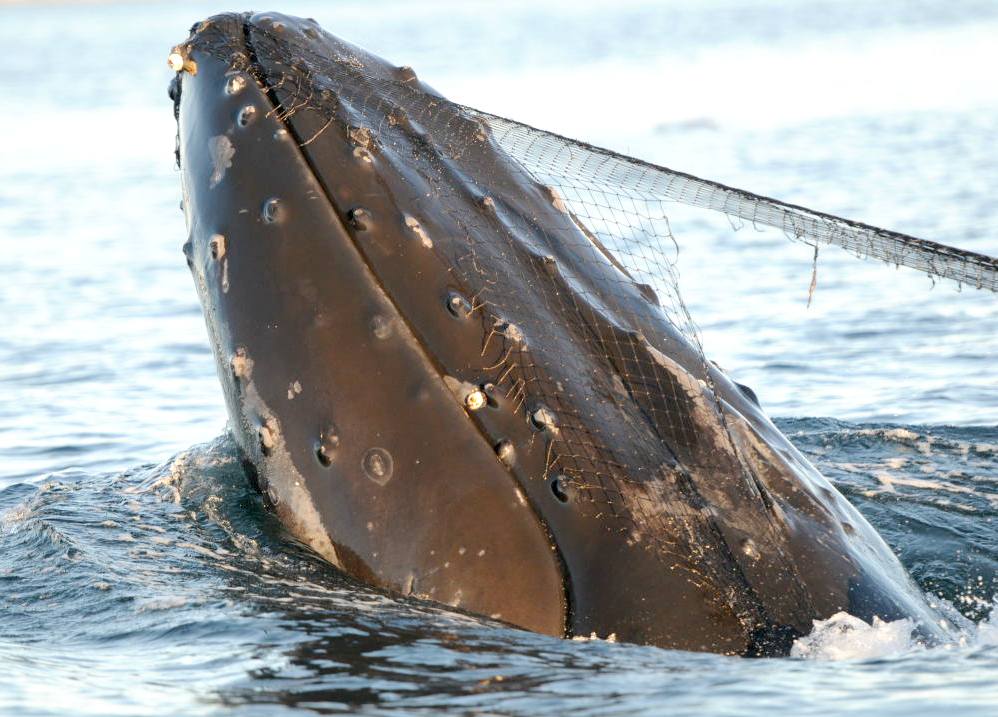
The
ultimate challenge, is to prevent mammals from becoming entangled in
fishing nets that should attract a prosecution under the Marine Mammals
Protection Acts.
SeaNews: How is the progress on “Zero Accident Campaign”? How this issue will be carried forward by IMO? How it will be reflected onto IMO work?
Koji Sekimizu: In 2012, I invited the International Association of Marine Aids to Navigation and
Lighthouse Authorities (IALA) and vessel traffic services (VTS) operators to undertake an initiative in which ports, harbours, straits and sea areas with VTS would count, and publicise, the number of consecutive accident-free days, a worldwide “Accident Zero” campaign.
Since then, the initiative has been under consideration by relevant IMO bodies and the IALA Council has further considered the proposal.
In January 2013, I established a Panel of Experts (involving IALA, the International Hydrographic Organization (IHO), IMO, the International Association of Ports and Harbours (IAPH), the International Maritime Pilots Association (IMPA) and the Chairman of the IMO Sub-Committee on Safety of Navigation. The objective for this Panel is to establish an IMO/IALA award which will be presented to the best performing VTS on a regional basis. Of course, while the concept is “Accident Zero”, we intend to recognize that high-density traffic areas and complex navigational fairways are at higher risk of accidents or near-misses. Therefore, the award would look towards highlighting those VTS which have done much to mitigate accidents within a VTS area. Indeed, the reporting of near-miss occurrences should be encouraged, in order to promote a safety culture.
Eight regional areas have been established and the first award is expected to be made in 2014.
SeaNews: What initiatives will be there for IMO to take after the Costa Concordia accident? Large passenger ship safety is continuous agenda item for IMO. What additional work will be undergone by IMO on this matter?
Koji Sekimizu: The Maritime Safety Committee (MSC, meeting from 12 to 21 June 2013) is currently discussing the recommendations arising from the
Costa Concordia casualty report.
A working group will be established to consider the report’s recommendations in detail and this group will report back to the Committee at the end of the session. I anticipate the MSC will agree an updated short-, medium- and long-term action plan, taking into consideration the recommendations, which address a wide range of matters, including: stability issues, electronic equipment, emergency power generation, evacuation analysis, and search and rescue, in addition to operational and management issues.
Already, the MSC last year agreed a number of recommended voluntary measures that could be put in place with immediate effect. These included carrying additional lifejackets, to be readily accessible in public spaces, so that, in the event of an emergency, passengers need not return to their cabins to retrieve the lifejacket stored there; reviewing the emergency instructions on board ships; carrying out the muster for embarking passengers prior to departure from every port of embarkation; limiting access to the bridge and ensuring that the ship’s voyage plan has taken into account IMO’s Guidelines for voyage planning, and, if appropriate, Guidelines on voyage planning for passenger ships operating in remote areas.
The MSC is expected at this session to adopt draft amendments to chapter III of the International Convention for the Safety of Life at Sea (SOLAS), to require musters of newly embarked passengers prior to or immediately upon departure, instead of “within 24 hours”, as stated in the current regulations.
It is, of course, important that IMO continues to take the lead, together with the industry, on enhancing passenger ship safety standards, particularly operational standards. In this context, I recognize and appreciate the coordinated efforts of the cruise industry to improve operational safety and actions already taken.
SeaNews: What are the current IMO initiatives with regard to proactive approach policy on marine accidents?
Koji Sekimizu: Earlier this year I announced that I would like to set a target of halving the number of lives lost at sea. This is an ambitious target but I think that by taking a number of proactive approaches we can work towards this.
The holding of the IMO Symposium on the Future of Ship Safety, on 10 and 11 June 2013, provided an opportunity to look at current trends and the Symposium Statement that was adopted, points to a number of key ways in which we can achieve greater safety. In particular, the Symposium participants invited the MSC to:
* consider how to improve data collection and increase its availability in order to support monitoring and development of safety regulations;
* consider how to better integrate risk-based methodologies and the latest analysis techniques into the regulatory framework on safety, to provide a sound scientific and practicable basis for the development of future safety regulations;
* consider ways of encouraging a safety culture beyond mere compliance with regulatory requirements;
* take into account the burden any new or changing regulation(s) place on seafarers and how this burden can be minimized; and
* consider undertaking a long-term comprehensive review of the existing regulatory framework on safety, with a view to ensuring that it will meet the future challenges associated with the application of new technologies, the human element, the needs of the maritime industry and the expectations of society, taking into account the ever-increasing pace of change and technological advancements made since the 1974
SOLAS and the International Load Lines Conventions were adopted.
SeaNews: SeaNews Turkey is a monthly magazine aiming to meet the Turkish maritime with the world and the World maritime with Turkish maritime. Thank you very much for taking your time for us and wish you every success at IMO. Thank you.
Koji Sekimizu: Thank you. I wish you every success too, with your new publication.
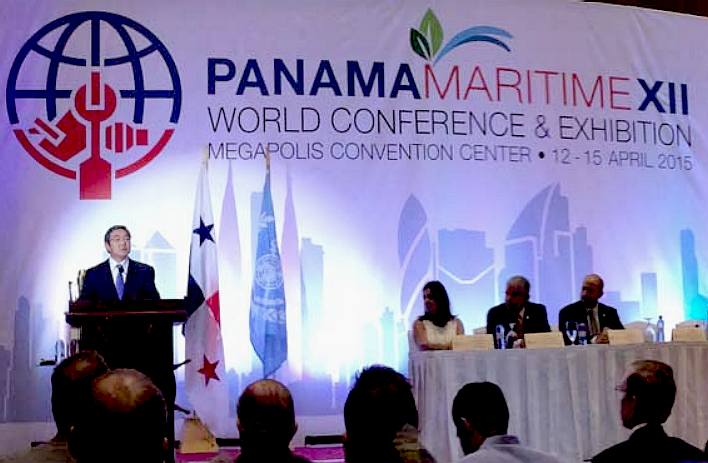
APRIL 2015 -
Mr Sekimizu attended the opening of the Panama Maritime XII conference.
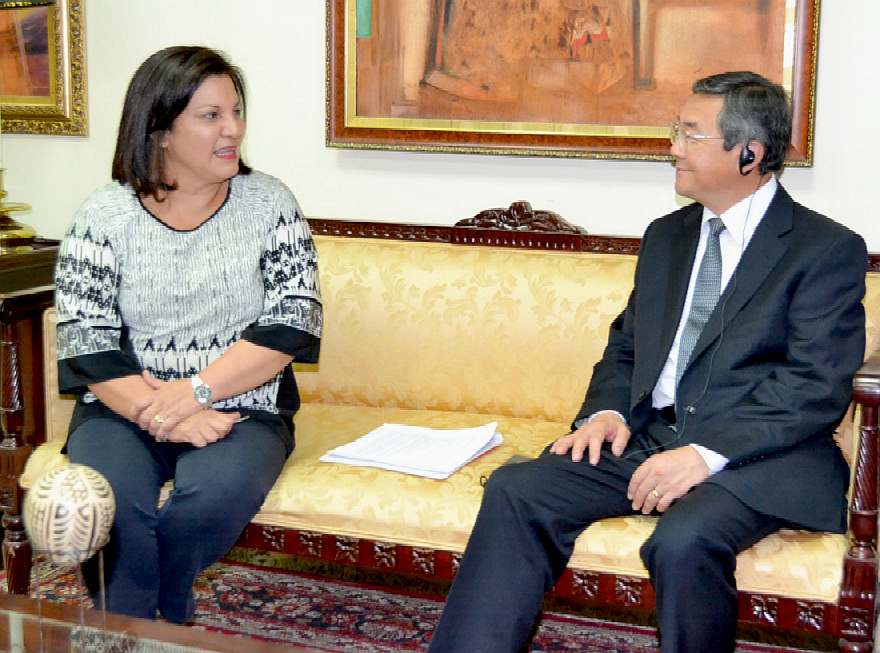
31
MARCH 2015 - During his mission to Central America, Honduras was the third country visited. The visit started with a courtesy call to Vice President, Ms Rossana Guevara, at the Ministry of Foreign Affairs.
As he'd done previously in Guatemala, the IMO secretary general encouraged the Vice President to promote maritime development in Honduras. With two significant coastlines, Honduras has real potential for future economic growth based on the maritime sector. He also emphasized the importance of establishing a national maritime transportation policy to encourage long-term investment to strengthen the country’s maritime infrastructure. Mr Sekimizu pledged IMO’s technical cooperation support to Honduras to establish its own national maritime transportation policy and commended its current efforts to promote short-distance maritime transport under the Mesoamerican Integration and Development Project. The Vice President requested further technical cooperation support from IMO for establishing a Particularly Sensitive Sea Area based on its important coastline on the
Caribbean Sea.
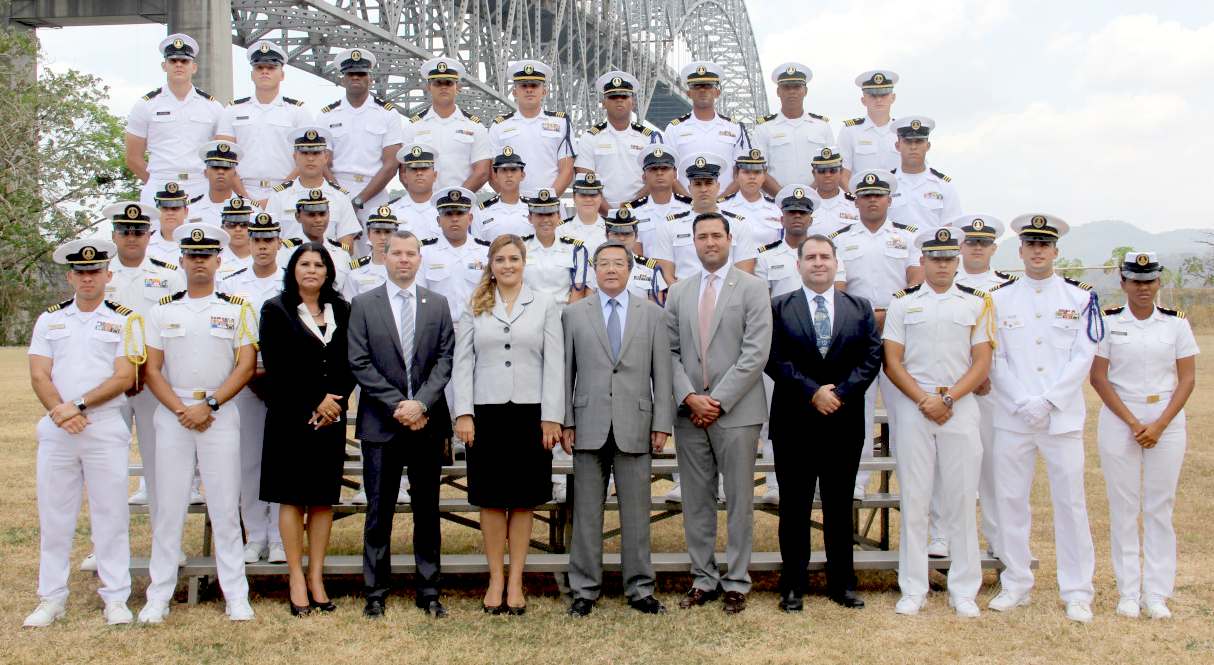
PANAMA
2015 - Koji Sekimizu with cadets enrolled at the International Maritime University
(IMUP), an excellent maritime educational institution in Central America. Koji had been invited to give a master lecture at the Conference Hall of the
Panama Canal Authority to cadets studying at the
IMUP.
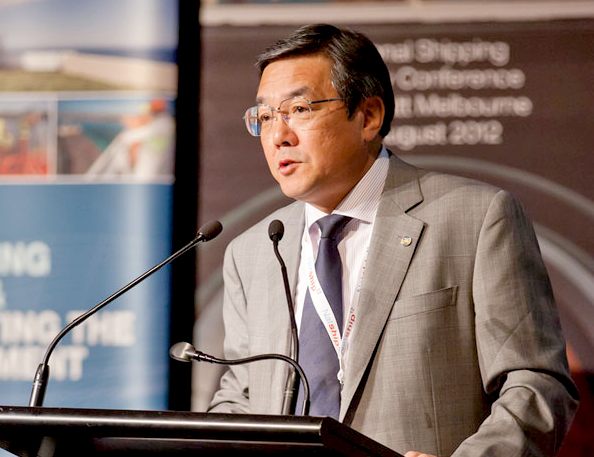
AUGUST 2012 - The seventh National Shipping Industry Conference, Natship12, was held in Melbourne, Australia. Natship12 is a biennial conference convened by AMSA, and this year was held in association with the Australian Shipowners Association, Australian Maritime Systems and the Department of Infrastructure and Transport. Koji Sekimizu, Secretary-General of the International Maritime Organization (IMO) was present along with more than 200 national and international delegates attending the sessions and social functions over the three days, the conference continues to be a popular event for industry stakeholders.
LINKS
& REFERENCE
Sea
news interview Koji Sekimizu IMO
blog secretary general IMOMedia
Centre Secretary General http://www.seanews.com.tr/news/127163/SeaNews-Interview-Koji-Sekimizu/
http://imosgblog.tumblr.com/
http://www.imo.org/MediaCentre/SecretaryGeneral/Pages/Default.aspx
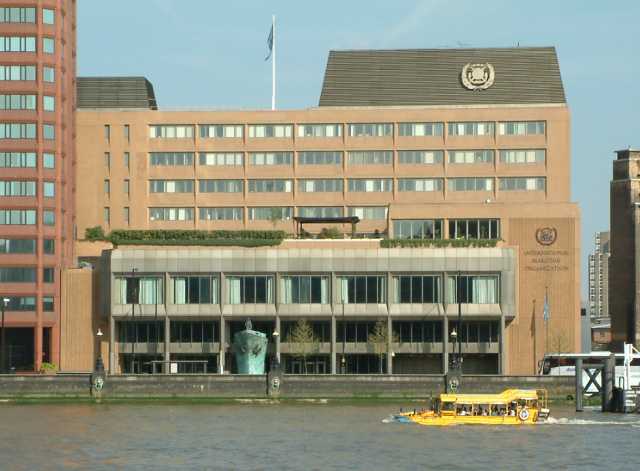
IMO, International Maritime Organization HQ, London, England.
ACIDIFICATION
- ADRIATIC
- ARCTIC
- ATLANTIC - BALTIC
- BERING
- CARIBBEAN - CORAL - EAST
CHINA
ENGLISH CH
-
GOC - GULF
MEXICO
- INDIAN
-
IRC - MEDITERRANEAN -
NORTH SEA - PACIFIC
- PERSIAN GULF - SEA
JAPAN
STH
CHINA - PLASTIC
- PLANKTON - PLASTIC
OCEANS - SEA
LEVEL RISE - UNCLOS
- UNEP
WOC
- WWF
|









